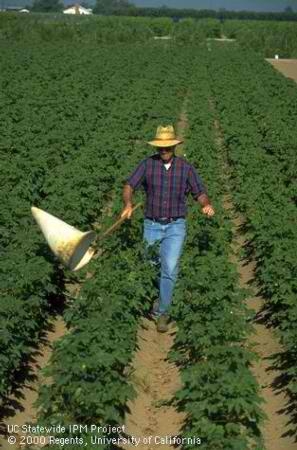Posts Tagged: Cooperative Extension
Deep Look's Award-Winning Aphid Video by Josh Cassidy--and a UC Davis Entomologist's Role
(Editor's Note: Watch Josh Cassidy's Deep Look award-winning video on YouTube.) UC Cooperative Extension specialist and...

Cooperative Extension specialist and agricultural entomologist Ian Grettenberger of the UC Davis Department of Entomology and Nematology is shown in this frame in KQED's Deep Look video on aphids. The work of Josh Cassidy, it won an international nature award, the equivalent of an Oscar. (Screen shot)
California Farm Bureau advocates for UC ANR
Policy advocate at the California Farm Bureau Federation, Taylor Roschen, wrote a 736-word commentary, published in AgAlert today, praising the value of UC Cooperative Extension advisors and advocating for an additional $20 million annual funding from the state of California.
Roschen provided highlights of UC ANR's public value, writing that:
- The breadth and depth of agricultural knowledge created by UC Agriculture and Natural Resources is unparalleled.
- Local Cooperative Extension staff, such as farm advisors and community education specialists, serve as translators, sharing the power of UC research with our farms, our families and our communities.
- 4-H youth leaders are 3.5 times more likely to contribute to their communities and nearly five times more likely to pursue higher education.
However, she continued, since 1990, the state's contribution to UCANR has decreased by 57%. California has lost more than 60% of its 4-H advisors since the 1990s and now have the equivalent of only 31 program representatives to serve the state's 58 counties.
To bring UC ANR programs "back from the brink," Roschen wrote, the California Farm Bureau is working with Assembly Agriculture Committee Chair Susan Eggman, D-Stockton, to fight for UCCE's future and save 4-H and local farm advisors and specialists.
"We are petitioning the state Legislature and the Newsom administration to provide an additional $20 million annually to UC ANR," she said.
Ag Award Recipient Rachael Freeman Long: A UC Davis Professor Sparked Her Interest in Biocontrol
Rachael Freeman Long treasures her memories as a graduate student in entomology at the University of California, Davis. She remembers eating fried...

Rachael Long, UCCE farm advisor, leads a tour of her family farm in Yolo County in April of 2015. "Hedgerows are important for enhancing beneficial insects, including bees and natural enemies, for better biocontrol and crop pollination in adjacent field crops, with measurable economic benefits," she says. (Photo by Kathy Keatley Garvey)
Do You Know What's In a Hedgerow?
If you like to see lady beetles devouring aphids or assassin bugs piercing spotted cucumber beetles, then you'll love the workshop taking place...

A lady beetle, aka ladybug, devouring an aphid. (Photo by Kathy Keatley Garvey)

An assassin bug, a beneficial insect, targeting a pest, a spotted cucumber beetle. (Photo by Kathy Keatley Garvey)

A green lacewing looking for love. Photo by Kathy Keatley Garvey)
NPR talks about land grant universities
While visiting the Smithsonian Folklife Festival, which is commemorating the 150th anniversary of the Morrill Act, NPR's Talk of the Nation did a segment about land grant universities.
Sara from Fresno called into the show to explain the role of UC Cooperative Extension. She said: "...we use the extension service to help us determine what kinds of things we can use to keep the crop healthy, not just pesticides, but how to check the crops and to make sure that they're healthy. They use independent research all the time to help us with this. And with the public funds just dwindling, we have a lot less independent research that go on and have to go on more of what the chemical companies are telling us."
When asked for an example, according to the show's transcript, Sara said: "Well, I'm looking at a cotton crop right now, and the farmer advisers, the cotton farmer advisors in California, helped us what the program called plant mapping, where we were able to take a look at what's going on with the plant even though we might have bugs out that could be damaging the crops."
Sandy Rikoon, professor of rural sociology at the University of Missouri, told listeners, "Many countries are trying to duplicate the extension system. Many countries have research, agricultural research, but what they don't have is that group of people who take the research and then take it to the people."
Host Neal Conan mistakenly said the California State University is one of the land grants and we have asked NPR to correct the online version to state that UC is California's land grant institution.




